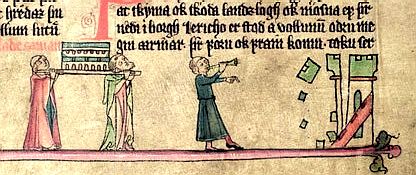Joshua fit de battle ob Jericho
an’ de walls cam' a tumblin’ down…

If you knew the details, you could have guessed the outcome.
The Beginning, Questions
| 1. | Remember back in 2002, when Yasser Arafat was living under siege? | |
| 2. | Remember the reason for the Israeli siege of Arafat’s compound? | |
| 3. | Remember the deal brokered by Bush — Arafat’s “get out of jail free card” — otherwise known as the Ramallah Agreement? |
The Beginning, Answers
| 1. | In March, 2002, a total of 125 Israeli civilians were killed by a variety of Palestinian terrorist groups, culminating in the “Passover Massacre” of elderly Jews in the Park Hotel on March 27th. Many of those killed and injured were Holocaust survivors. Hamas claimed responsibility for this, and while English versions of the story from the Palestinian Authority decried the violence, the Arabic taqiyya version glorified the “shahid” — the witness the killers bore for Islam. This gruesome and sadistic attack triggered an Israeli response, Operation Defensive Shield. By the beginning of April, Israel had mobilized twenty thousand soldiers and began incursions into Palestine to round up terrorists. By May 10th, the IDF had moved back into Israel. | |
| 2. | At the time, Yasser Arafat’s compound in Ramallah was placed under siege. Inside the compound with Arafat were six “militants” wanted by the Israelis for the killing of civilians and particularly wanted was Ahmed Sadaat, who they claimed ordered the assassination of the Israeli minister of Tourism, Rehavam Zeevi. Sadaat, one of the leaders of The Popular Front for the Liberation of Palestine, was considered the brains behind the operation. | |
| 3. | And then came the famous “Ramallah Agreement.” This arrangement, brokered by the U.S., arranged for the six men to be transferred from Arafat’s compound to a Palestinian Authority prison in Jericho. Their continuing incarceration was to be monitored by American and British personnel. |
The Middle, Questions
| 1. | Remember the Hamas victory in the elections in Palestine in January, 2006 — a victory which included three seats for Sadaat’s PFLP? | |
| 2. | Remember Hamas’ immediate pronouncements that Sadaat and his fellow prisoners should be freed, and Abbas’ refusal to stand in their way? | |
| 3. | Remember the nervous letter from the British and Americans in Jerusalem to the Palestinian Authority? |
The Middle, Answers
| 1. | Sadaat’s win in the Hamas victory was seen as a wedge that could serve to have him removed from the Jericho prison and released. Of course, “prison” for Sadaat included his own quarters where guards were not permitted. These quarters included his own kitchen and access to cell phones and visitors. | |
| 2. | Abbas knew better than to go head-to-head with Hamas on the matter of Sadaat’s release. | |
| 3. | After Hamas’ victory, any monitoring by outside authorities became more and more tenuous as due process continued to deteriorate in Palestine. Neither the British nor the Americans were willing to go on with a situation that was being flouted by Hamas and the PA. However, the monitors couldn’t announce they were leaving — or they might not have gotten out alive themselves. |
The End, Questions
| 1. | Did the Palestinian Authority “know” that the Jericho prison would be attacked by the IDF? | |
| 2. | Is there a pay-off for Palestine? | |
| 3. | Is there a downside for Israel? |
The End, Answers
| 1. | If the PA or Hamas was not aware of the gathering IDF forces, then they are surely idiots. It is hard to credit such “ignorance.” They probably couldn’t time the attack, but they probably knew it was coming as Sadaat’s “imprisonment” became increasingly de jure. | |
| 2. | The payoff for Palestine has several facets. First, the favorite circuses of the Arab Street: immediately grab hostages and threaten strikes… since they’re all government employees in Palestine, strikes are a joke. And obviously Hamas has this one by the reins, since all the This also relieves both the PA and Hamas of a headache, which is what Sadaat had become. It is easier to have him out of their jurisdiction, though they never could have allowed themselves to actually “permit” his removal by Israel. They are now rid of their headache and freer to ratchet up the terror attacks against Israel in revenge. | |
| 3. | The downside for Israel is the usual take-it-on-the-chin criticism from the EU and other civilized entities. However, Blair and Bush had washed their hands of the shenanigans at Jericho some time ago. The Israeli Left will complain, but whether or not it hurts the up-coming elections is another matter. |
So the wall came tumbling down. And Israel has its assassins, Sadaat, and the man responsible for the Karin-A, a ship full of arms meant for Palestine. Everyone will go on trial eventually, but at least Sadaat is in a real prison, rather than his apartment in the Jericho jail.
For a man who vowed not to be taken alive, he seems to be breathing still.

2 comments:
"the EU and other civilized entities"
Do you mean to imply that the EU is civilized? What evidence do you have for that assertion?
Dympha:
Well let,s remember that to Arab Moslems, war is deceit. Thus the louder the chest thumping about dying with the last bullet etc is merely threatrics to cover up some pragmatic deal making in the shadows.
Besdides Saadat knows that he a live symbol is more powerful than a dead one. Dead means you were incompetent. Live means you were smart enough to put off death for another day.
EU elite love to ponticate; the ordinary Europeans cheer the Israelis and wish their own politicians had the same decisiveness
xavier
Post a Comment